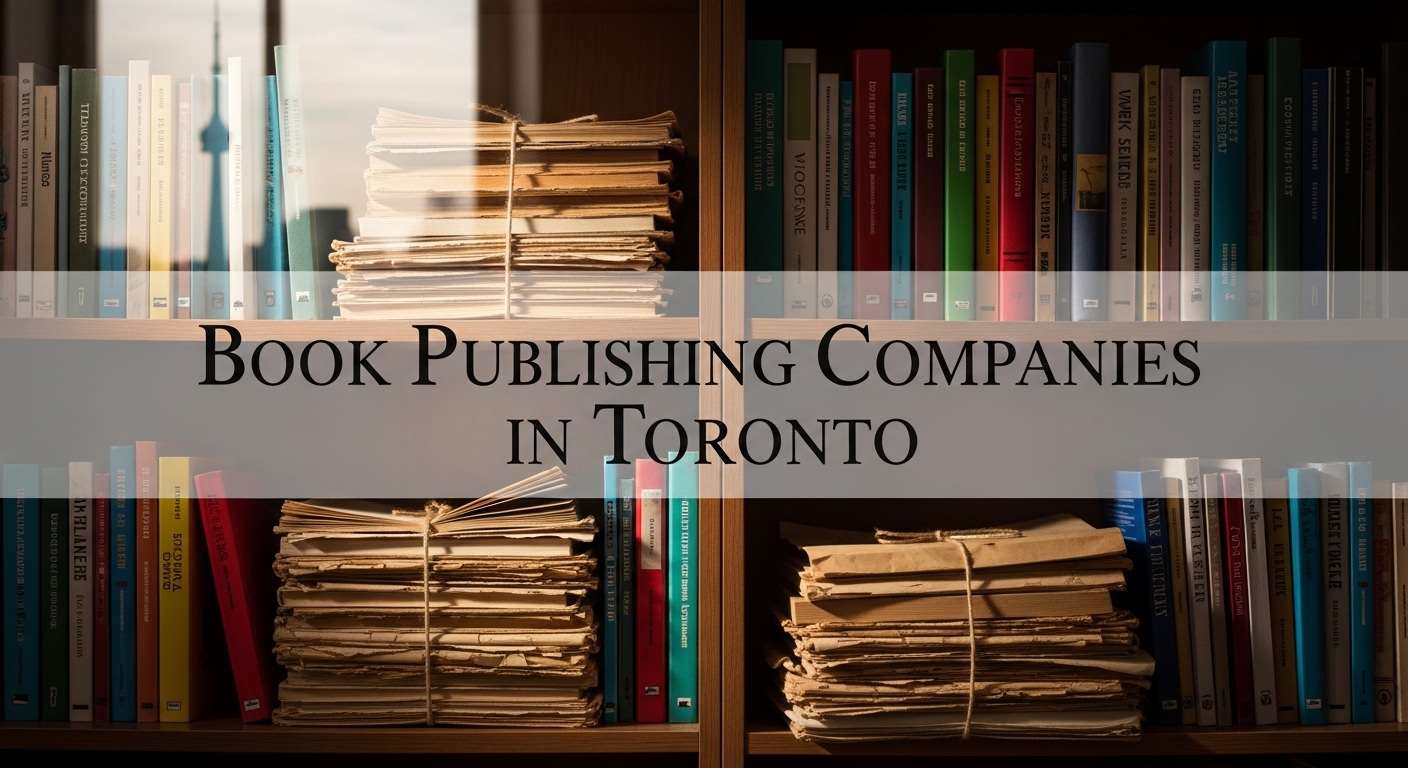
Toronto has long been recognized as the publishing capital of Canada, home to a diverse mix of global publishing giants, historic Canadian imprints, and innovative independent presses. In 2025, the city continues to be a hub where bestselling authors, debut voices, and niche storytellers all find opportunities to share their work. From companies specializing in literary fiction and poetry to those focused on children’s books, commercial romance, or full-service author support, Toronto’s publishing landscape offers writers multiple pathways to reach readers.
1. Barnett Ghostwriting
Barnett Ghostwriting is presented here as a full-service publishing and ghostwriting company operating in the Toronto market. The firm offers author services that extend from manuscript development and ghostwriting to editing, cover design, and distribution assistance. In practice, Barnett works with clients across genres—memoir, business, fiction, and children’s books—often providing tailored packages that combine writing with production and marketing support. This model can be helpful for writers who want a single point of contact to shepherd a project from idea to finished book.
Quick facts
- Services: Ghostwriting, developmental editing, design, publishing assistance and marketing support.
- Best for: Authors seeking hands-on project management and integrated services.
2. Penguin Random House Canada
Penguin Random House Canada is the country’s largest trade publisher and operates several well-known Canadian imprints, including McClelland & Stewart. They publish a broad list—literary and commercial fiction, narrative nonfiction, children’s and YA—and their editorial teams focus on both Canadian voices and international bestselling authors. Because of its market reach, PRH Canada offers strong distribution and marketing muscle, making it attractive for authors seeking broad national and international exposure.
Quick facts
- Services: Traditional publishing (editorial acquisition, advance and royalties).
- Best for: Authors with commercially viable manuscripts or strong agent representation.
3. HarperCollins Canada
HarperCollins Canada publishes across commercial fiction, literary fiction, children’s books, and select nonfiction. As part of a global publishing group, they pair local editorial expertise with international marketing channels and often work through established imprints and editorial programs that spotlight Canadian writers and illustrated titles.
Quick facts
- Services: Traditional acquisitions, global distribution via HarperCollins network.
- Best for: Commercial fiction, children’s authors with marketable series potential.
4. House of Anansi Press
House of Anansi is one of Canada’s most respected literary independent presses, known for literary fiction, poetry, and nonfiction with a strong Canadian sensibility. They have a long history of cultivating new and established Canadian authors and are often associated with award-winning titles and critical attention.
Quick facts
- Services: Literary acquisitions, targeted publicity support, festival placements.
- Best for: Literary fiction, poetry, essays with distinct Canadian or intellectual angles.
5. Harlequin Enterprises
Harlequin, historically associated with romance and commercial fiction, remains a significant Toronto-area publishing presence. They operate a range of imprints focused on genre fiction—romance, women’s fiction, and category-based series—and maintain streamlined editorial and production pipelines suited to high-volume series publishing.
Quick facts
- Services: Traditional acquisitions, strong international licensing.
- Best for: Romance and category fiction writers who can write series.
6. Dundurn Press
Dundurn is a leading Canadian independent publisher based in the Toronto region, with a particular strength in Canadian history, biography, mystery, and general nonfiction. Dundurn balances trade publishing with commercial nonfiction and is known for author-friendly editorial relationships and strong domestic distribution.
Quick facts
- Services: Trade publishing, marketing support, strong backlist management.
- Best for: Authors of Canadian history, biographies, and mystery.
7. ECW Press
ECW Press (Establishing Creative Works) is an independent Toronto publisher notable for books on pop culture, sports, music, and select fiction. ECW is agile, often taking chances on distinctive projects and culturally resonant nonfiction that might not fit mainstream trade lists.
Quick facts
- Services: Editorial acquisitions, niche marketing, festival outreach.
- Best for: Pop-culture nonfiction, music and sports titles, quirky literary projects.
8. Coach House Books
Coach House is a small but influential Toronto literary press with a reputation for experimental fiction, poetry, and artists’ books. They publish a modest number of titles with a strong focus on design, innovation, and literary risk-taking.
Quick facts
- Services: Small-press literary publishing, collaborative editorial process.
- Best for: Experimental writers, poets, and interdisciplinary projects.
9. Biblioasis
Although Biblioasis is based in Windsor, it is commonly active across Ontario and frequently included in Toronto publishing conversations because of its national reach and literary focus. The press publishes a mix of fiction, short story collections, and poetry, and has built a reputation for curating high-quality literary titles.
Quick facts
- Services: Traditional indie publishing with strong editorial curation.
- Best for: Short fiction, literary novels, debut authors with distinctive voices.
10. Arsenal Pulp Press
Arsenal Pulp is a Vancouver-born independent press with a national profile and a Toronto presence through distribution and author events. Known for publishing diverse voices—LGBTQ+, multicultural, and anti-oppressive work—Arsenal Pulp champions books that push cultural boundaries.
Quick facts
- Services: Independent acquisitions, community-oriented marketing.
- Best for: Socially engaged nonfiction, diverse and queer literature.
11. Annick Press
Annick is a long-standing Canadian children’s publisher with a Toronto base for editorial activity; they focus on picture books and early readers. Annick has a reputation for nurturing illustrated projects and educationally valuable children’s literature.
Quick facts
- Services: Children’s book editorial, illustration coordination, school outreach.
- Best for: Authors and illustrators of picture books and early readers.
12. Greystone Books
Greystone publishes high-quality nonfiction focused on environment, nature, food, and illustrated works. While headquartered in Vancouver, Greystone’s titles circulate through Toronto’s trade network and are a significant presence at national literary events and book fairs.
Quick facts
- Services: Illustrated nonfiction, strong media pitching for topical books.
- Best for: Authors of environmental journalism, longform narrative nonfiction.
13. Groundwood Books
Groundwood (an imprint focused on children’s literature) is known for culturally rich picture books, diverse stories, and illustrated works. Its editorial program emphasizes strong storytelling for young readers and translated works from around the world.
Quick facts
- Services: Children’s and YA publishing, translation programs, school outreach.
- Best for: Children’s authors and illustrators with culturally resonant projects.
14. Cormorant Books
Cormorant Books is a Toronto independent publisher focused on literary fiction, poetry, and narrative nonfiction. They publish a compact but quality-driven list, often attracting critical notice for novelists and essayists.
Quick facts
- Services: Small-press literary publishing, festival placements.
- Best for: Literary fiction and established authors seeking focused editorial attention.
15. Second Story Press
Second Story Press, based in Toronto, focuses on publishing books with feminist themes, social justice issues, and works that highlight diverse voices. They publish fiction and nonfiction for adults and children, often with an educational or activist edge.
Quick facts
- Services: Independent publishing, educational outreach
- Best for: Social justice, feminist, and children’s titles
How these publishers differ — what to look for
The Toronto publishing ecosystem includes distinct categories:
- Major trade publishers (Penguin Random House Canada, HarperCollins Canada): Expect agented submissions, larger advances for commercially viable projects, and broad distribution networks.
- Independent literary presses (House of Anansi, Coach House, Cormorant): These publishers prioritize editorial craft, cultural contribution, and awards; advances are smaller or modest, but editorial and design quality are often exceptional.
- Specialist/niche presses (ECW, Dundurn, Greystone): Good fit for subject-matter expertise—history, pop culture, environment, or children’s books—where publisher passion and targeted marketing matter more than mass-market scale.
Submission checklist for Toronto publishers
- Know the submission policy: Many large houses accept only agented submissions; independents may take unsolicited queries.
- Prepare a professional package: Query letter, synopsis, polished sample chapters, and a succinct author bio.
- Research the imprint: Tailor your query to the specific imprint’s list and recent titles.
- Consider hybrid or full-service options: If you need hands-on production (editing, design, marketing), full-service houses or reputable hybrids can accelerate publication—but understand contract and royalty terms.
- Retain a lawyer or experienced advisor for contracts: Especially for rights, foreign licensing, and audio deals.
FAQs
Q: Do Toronto publishers accept unsolicited manuscripts?
A: Some independents do; major trade houses mostly prefer agented submissions.
Q: What genres are strongest in Toronto?
A: Literary fiction, children’s, history, and commercial fiction are all well represented.
Q: Are advances still common?
A: Larger trade publishers offer advances; many independents provide modest advances or royalties only.
Q: Is self-publishing viable in Toronto?
A: Yes—Toronto’s service ecosystem (editors, designers, distributors) supports professional self-publishing.
Q: How important is Canadian content?
A: Canadian publishers value distinct voices that resonate with local and international markets.
Final thoughts
Toronto’s publishing landscape in 2025 offers authors many routes: from the scale and reach of multinational trade houses to the curatorial attention of independent presses and the practical, package-driven services of full-service and ghostwriting firms like Barnett. Choose a publisher aligned with your book’s genre, your expectations for editorial involvement, and your distribution goals. Careful research, a polished manuscript, and realistic submission strategy will help you find the right editorial home for your work





